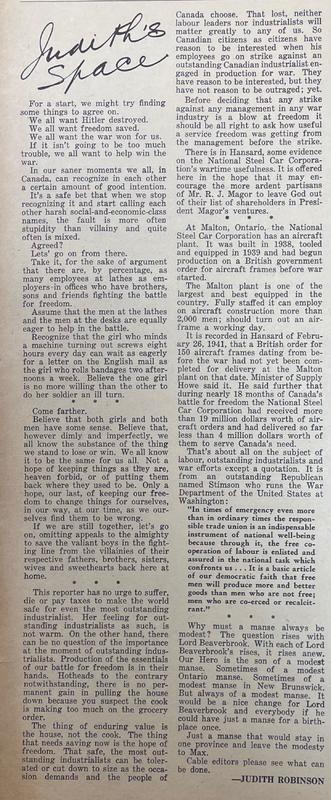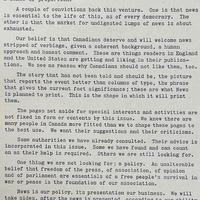Conclusion
The time before and during the Second World War oversaw the lack of wartime effort in Canada. When Judith Robinson saw this during her time at the Globe and Mail, she ventured to create a platform that would authentically address these issues without hindrance from press authorities. Thus became the creation of NEWS, a newspaper that was made to call out Canada’s lack of war preparation, its political figures, and to focus attention on local news for viewers seeking contemporary truths. In fact, Robinson and co-editor Dalgleish addressed readers of NEWS during the first issue, stating it to be their policy and cementing the belief that any opinions NEWS presented were of their volition. [xvi]
The first issue of NEWS included an article written by Robinson—the start of a column called "Judith's Space". In it, Robinson presents a series of statements, saying that these are things people can agree upon. [xvii] By doing this, she creates a cornerstone of NEWS—its foundation on the basis of what news can be presented during a time of war.
Moreover, the presence of female writers in the mid-20th century can be found in Robinson's act—all actively making changes through their work. Her disassociation from Globe and Mail and establishment of an honest platform emphasize an awareness among Canadians who were displeased with the lack of attention being shed on political matters. Despite Robinson's movement as a female writer, her obituaries do not regard her as an accomplished writers. If we look over to Aleem and Ryan's exhibit analysing the sociolinguistic language surrounding Robinson's obituaries, we can see that a lot of the language used in her obituaries watered down her achievements and her personality. Through this, we can conclude that the effort Robinson gave was unusual for someone of her nature.
We can then look over to Emily-Anne and Nick's exhibit mentioning the lack of conversation surrounding Robinson upon her death. Although she was well-known, it was not to an extent where obituaries concerning her would be deeply personalized—there was a number of obituaries that would quote either her writings or other obituaries. This lack of conversation upon Robinson suggests that despite the celebrity surrounding her writings, she was not a particularly well-known writer and information about Canada's war effort—the main backbone of NEWS—remained a topic not too sought out for. This is backed up by the difficulty that we had when it came to finding secondary sources upon either Judith Robinson, or the newspaper co-founded by both her and Oakley Dalgleish.
Despite the lack of immense success and popularity after the establishment of NEWS, Judith Robinson’s work challenged decades of press censorship during a time of crucial effort in welfare and national military needs. The establishment of NEWS was a significant shift in Canadian press history whereby it challenged the contemporary patterns of news allocation. Moreover, Robinson’s initiative ushered opportunities for local writers, and the chance for a truthful history to be written. She inspired writers after her time to willingly and fearlessly express socio-political issues, such as George Grant, author of Lament for a Nation. It is thanks to her and Dalgleish that Canada can look back at its own history with accuracy.

